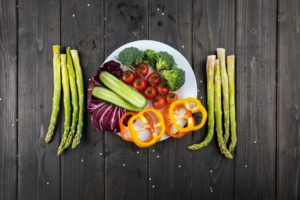Resident registered dietitian Heather Daniels gives her dietary advice for diabetes with tips and pointers for how to better manage your condition.
Managing your Diabetes well should always be a priority.
However, the current situation has put this into much sharper focus for many people, as we now know that one in four people (26%) who have died in hospital in England following a diagnosis of coronavirus had diabetes. It is thought that COVID-19-related mortality is significantly and independently related to hyperglycaemia (raised blood glucose levels).
The good news in all of this is that lowering your blood glucose levels is entirely possible.
1) Dietary advice for diabetes – keep your diabetes under better control by choosing the right carbohydrates.
So, I hear you ask, what can I do to keep my diabetes under better control?
My first tip for eating well with Diabetes is this….CARBOHYDRATES ARE NOT THE DEVIL!
Although carbohydrates are converted into glucose, some glucose is essential for energy.
By avoiding carbohydrates, we are often left feeling hungry and this in turn leaves us vulnerable to temptation.
Choosing the right Carbohydrates
The best way to ensure that you eat foods that do not cause a ‘spike’ in your blood glucose levels is to choose wholegrain carbohydrates, as these turn into glucose at a much slower rate.
Examples of wholegrain carbohydrates that you could implement in your diet are:
- Porridge Oats
- Shredded Wheat
- Seeded bread
- Basmati rice
- Sweet potatoes
- Rye Bread
- Bulgar wheat
- Corn
Dietary advice for diabetes – Being aware of carbohydrate portion size
In addition to choosing the right carbs, be mindful of the portion size you are eating. Try to limit carb portions to no more than ¼ of your (standard dinner) plate.
2) Dietary Advice for Diabetes – eating less salt
Your diabetes means that you are more at risk for heart diseases and strokes. A diet high in salt may increase your blood pressure which in turn increases your risk of these conditions. Therefore it is vital to be aware of your salt intake when living with diabetes.
Know your limits
As a person living with diabetes you should try to limit yourself to a maximum of one teaspoon of salt a day. If you prefer metrics that’s around 6g!
Pre-packaged food is often very high in salt so always check labels and try to avoid products with a high salt content. Even better – cook fresh food at home from scratch. That way you are in control of how much salt find its way into your meal.
But food with no salt is tasteless!
This is the complaint I regularly get from clients who I’ve advised to lower their salt intake! My advise is to use your imagination… experiment with different herbs and spices to create dishes that delight your taste buds as well as your blood pressure levels!
3) Dietary Advice for Diabetes – choosing the right fats
We’ve learnt that some carbs are better than other – well the same is true when it comes to fatty foods!
In planning a healthy diet – fat in itself is not the enemy.
We need fat in our diet as it gives us energy. But not all fats were created equal!
When planning means and snacks seek out foods that have unsaturated fats. Some excellent sources of unsaturated fats are:
- avocado
- oily fish (mackerel, salmon, kippers, trout)
- some (unsalted)nuts, such as almonds, brazils, and peanuts
- Olive oil
- Rapeseed oil
- Sunflower oil

Unhealthy saturated fats are found mainly in animal products or processed foods. These are the type of products you should try and minimise in your diet when living with diabetes:
- red meat
- processed meat
- butter / lard
- Ghee
- biscuits
- cakes
- Pies
It’s worth bearing in mind that, even for the ‘good’ fats, only small portions are advised. Fat is a great source of energy but it’s also therefore high in calories and can contribute to weight gain.
4) Dietary Advice for Diabetes – eating more fruit and veg!
‘Eat up your greens!’ It’s a mantra we’ve all heard since we were children moving our broccoli around on our plate! But our parents knew what they were talking about! They really are good for us and form a vital part of a healthy diet. They contain the vitamins, fibre, and minerals that our bodies need to keep healthy.

My advice, if you’re someone who has struggled to eat enough fruit and veg over their lifetime, is to make a concerted effort to make them part of your routine. Bulk up the portion size at meal time. Pre prepare snacks (portions of fruit salad or crudités sticks of cucumber and carrot). This way you have an easy and healthy option waiting for you when you get the munchies.
But isn’t fruit full of sugar?
The sugar found in whole fruit is natural sugar. This is very different to the ‘added’ sugar you find in cakes, sweets and chocolate. Natural sugar is fine for those living with diabetes – added sugar is not! It’s still important not to go crazy though – portion size should be limited to no more than one portion at a time (3-4 per day). One portion of fruit is equivalent to 1 medium apple, 2 plums or 8-10 grapes.
5) Dietary Advice for Diabetes – cut down on added sugar
While we’re on the topic we may as well talk a little more about one of the most crucial aspects of diet control when you have diabetes – cutting out added sugar.
We all know that this is easier said than done. Added sugar is highly addictive – and it’s everywhere – so the idea of cutting it out entirely can feel overwhelming.
My advice is to start by making some small swaps. Try your tea or coffee without sugar – you may be surprised at how quickly you get used to the new taste. Swap out sugary drinks with water.
Cutting out added sugar will ultimately help you both control your blood glucose levels and lose weight – so it’s worth persevering with – however hard you may find it at first.

6) Dietary Advice for Diabetes – cut down on alcohol
This may well not be a popular point in these pandemic times – but another crucial way that you can help your diabetes through your diet is by cutting down on alcohol.
Alcohol is high in ’empty calories’ so if you’re trying to lose weight it is very definitely not your friend! I advise that you try to keep to a maximum 14 units a week. This should be spread out (I don’t encourage binge drinking!) and you should also try to be alcohol free for a number of days each week.
Creating your individual plan
Of course every body is different, and every person faces their own personal challenges. My clients often find the focus and clarity of an individual plan hugely motivating, and they soon start to see real results.
If you would like to discuss your own individual plan, please contact me for more information!

